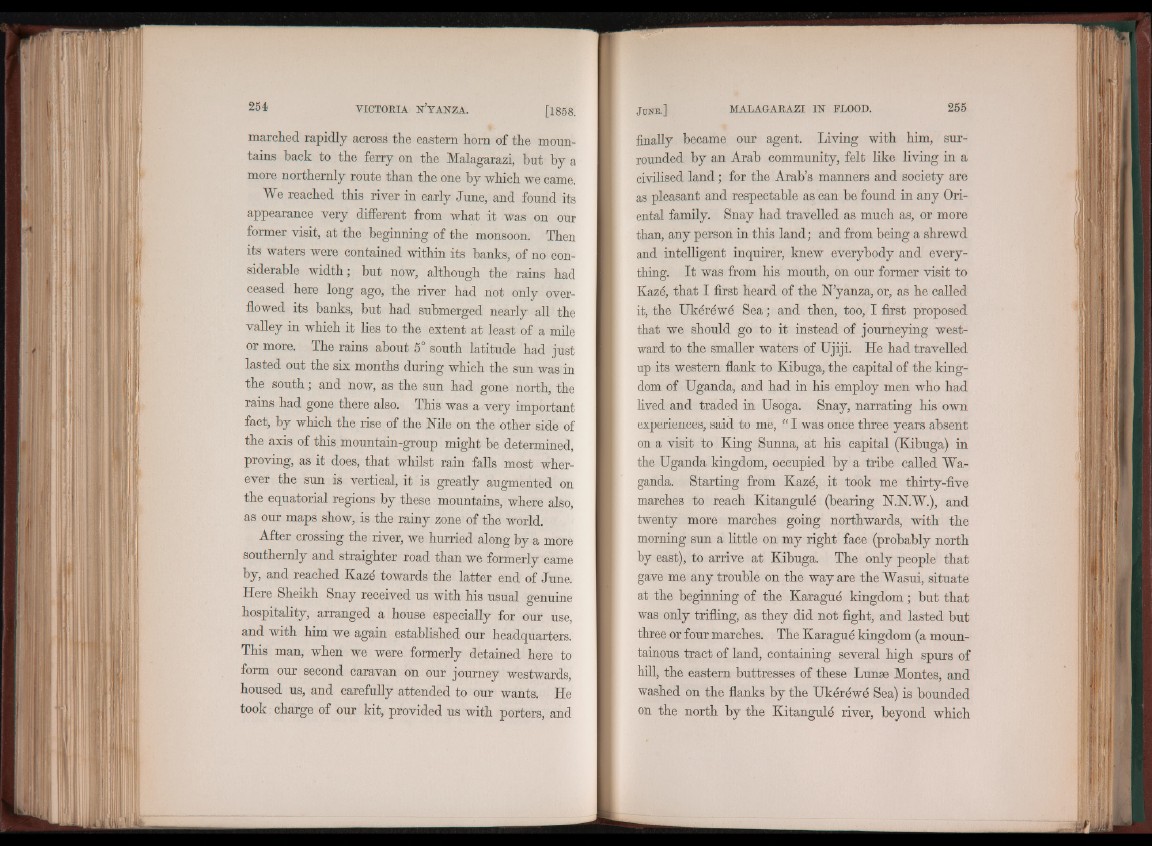
marched rapidly across the eastern horn of the mountains
back to the ferry on the Malagarazi, but by a
more northernly route than the one by which we came.
We reached this river in early June, and found its
appearance very different from what it was on our
former visit, at the beginning of the monsoon. Then
its waters were contained within its banks, of no considerable
width; but now, although the rains had
ceased here long ago, the river had not only overflowed
its banks, but had submerged nearly all the
valley in which it lies to the extent at least of a mile
or more. The rains about 5° south latitude had just
lasted out the six months during which the sun was in
the south; and now, as the sun had gone north, the
rains had gone there also. This was a very important
fact, by which the rise of the Nile on the other side of
the axis of this mountain-group might be determined,
proving, as it does, that whilst rain falls most wherever
the sun is vertical, it is greatly augmented on
the equatorial regions by these mountains, where also,
as our maps show, is the rainy zone of the world.
After crossing the river, we hurried along by a more
southemly and straighter road than we formerly came
by, and reached Kaze towards the latter end of June.
Here Sheikh Snay received us with his usual genuine
hospitality, arranged a house especially for our use,
and with him we again established our headquarters.
This man, when we were formerly detained here to
form our second caravan on our journey westwards,
housed us, and carefully attended to our wants. He
took charge of our kit, provided us with porters, and
finally became our agent. Living with him, surrounded
by an Arab community, felt like living in a
civilised lan d ; for the Arab’s manners and society are
as pleasant and respectable as can be found in any Oriental
family. Snay had travelled as much as, or more
than, any person in this land; and from being a shrewd
and intelligent inquirer, knew everybody and everything.
I t was from his mouth, on our former visit to
Kazd, that I first heard of the N’yanza, or, as he called
it, the Ukdrdwd Sea; and then, too, I first proposed
that we should go to it instead of journeying westward
to the smaller waters of Ujiji. He had travelled
up its western flank to Kibuga, the capital of the kingdom
of Uganda, and had in his employ men who had
lived and traded in Usoga. Snay, narrating his own
experiences, said to me, “ I was once three years absent
on a visit to King Sunna, at his capital (Kibuga) in
the Uganda kingdom, occupied by a tribe called Wa-
ganda. Starting from Kaze, it took me thirty-five
marches to reach Kitanguld (bearing N.N.W.), and
twenty more marches going northwards, with the
morning sun a little on my right face (probably north
by east), to arrive at Kibuga. The only people that
gave me any trouble on the way are the Wasui, situate
at the beginning of the Karagud kingdom; but that
was only trifling, as they did not fight, and lasted but
three or four marches. The Karagud kingdom (a mountainous
tract of land, containing several high spurs of
hill, the eastern buttresses of these Lunse Montes, and
washed on the flanks by the Ukdrdwd Sea) is bounded
on the north by the Kitanguld river, beyond which